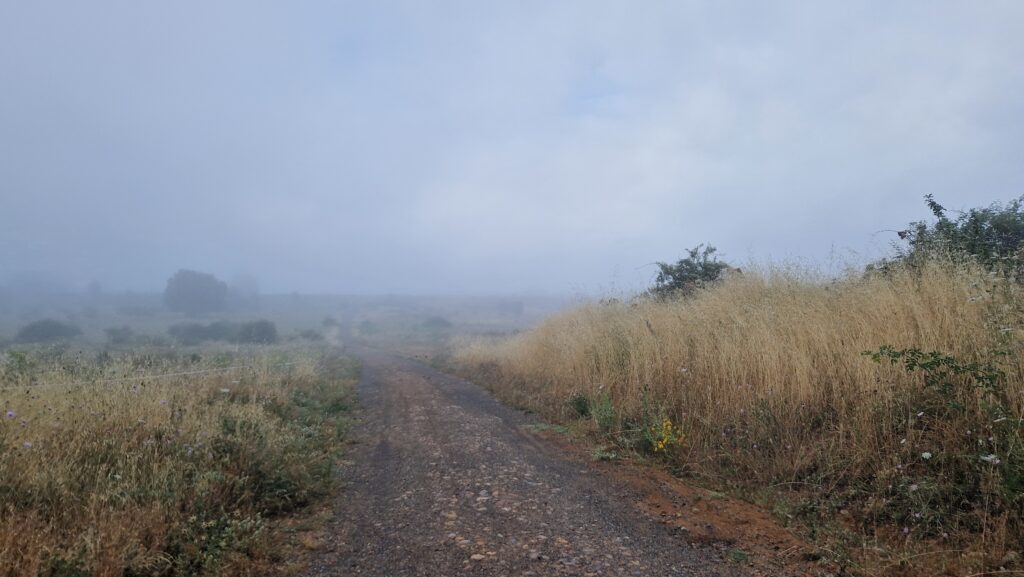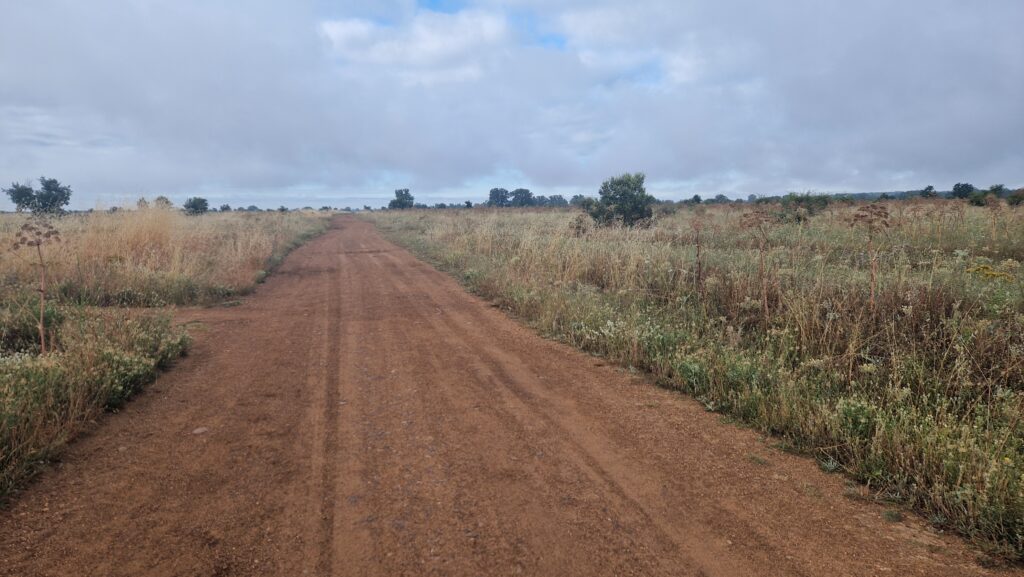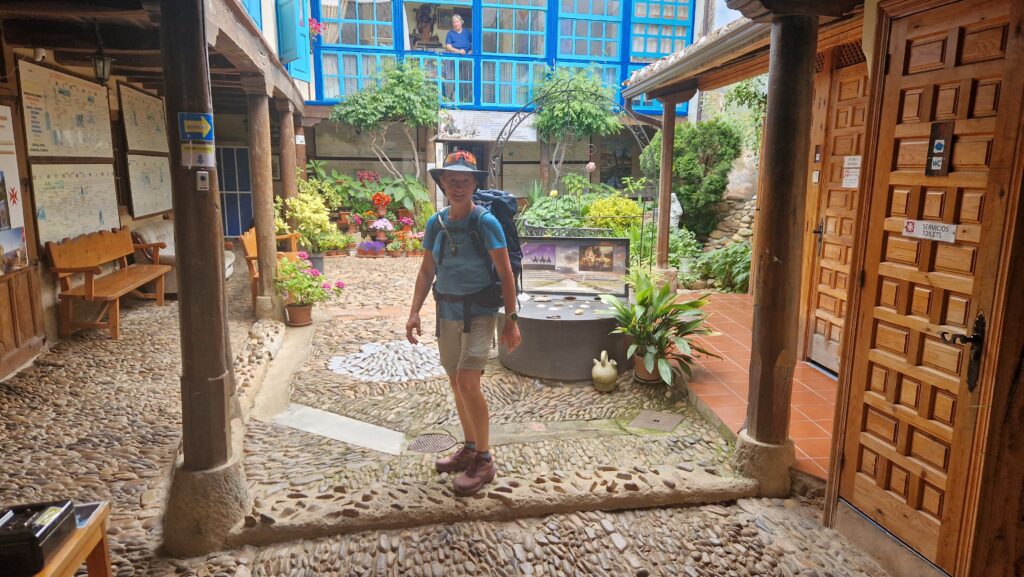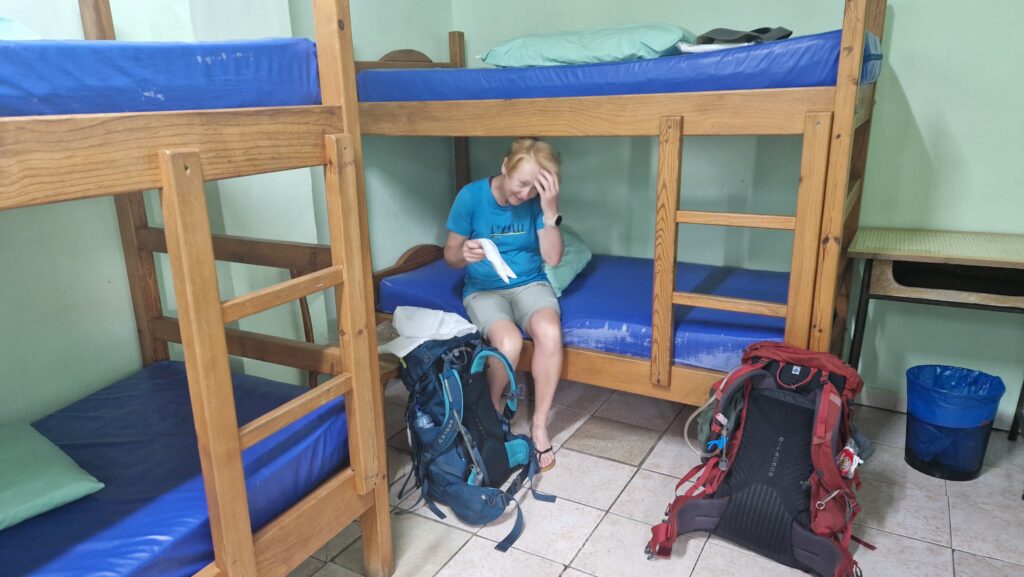At 6am León is dark and empty, only pilgrims are creeping out of their hostels and funnel down into the yellow-arrowed streets. It’s not too well marked in the city, actually: once we have to call a couple to come back to the right track and one time somebody helps us.
Long suburban area out of the city, the same as in. Wide highway and typical for such areas services, car dealerships, some offices. A couple of times we walk through a living area, and those seem to be former separate suburbian towns, now gradually being merged into León’s gravitational field.
We take the alternative road that promises to take us further away from the highway. It is a misty morning. Nobody on this road so far (8:30am). It feels good to have to make a decision, like we’re a bit in control of our day. Even though it adds 3,5km to an already 32km stage, it does take us away from the loud highway, of which I’m already tired by then.


A bit of white wine at around 10am – eh, it’s 12 somewhere… no regrets.
It smells of either camomile or some other herb that must be popular in tea infusions: most German kitchens smell like this.
We take 2 or 3 short stops to rest, and it helps a lot, the 37km that this stage ended up being fly by.
On the road I read the story of a knight who set up a tournament here in 1434. A mr. Suero de Quiñones. A story about his lady friend, and how he’s worn a steel collar and how he held a tournament and this and that… only to be able to say he is free from being in love with her and could now go on a pilgrimage or whatever, is so mind-nummingly boring, that it’s only redeemed by having happened around this area of Órbigo on July 11, 1434, which makes it exactly 590 years ago, tomorrow. They now get to pretend-joust here or something every now and then in his honor, although the dude is also known to have lead some pogroms against the Jews afterwards, the bastard.
The place where we are today isn’t the smallest I’ve seen and, how should I put it… extremely rural? The bar that we go to for a lunch is full of older gentlemen who are paying cards and drinking small shots of something, smoking and verbally fighting about something the whole time. No women, besides the ones serving drinks behind the counter. I realise that all of them have grown up in Franco’s Spain… isn’t it something? We’ll see what the evening brings. Dare I show up to dinner wearing shorts? It’s been, like, almost 50 years, so maybe…

This albergue was originally set up by the Maltesers, now run by a German mission. The garden is beautiful, the courtyard is very inviting, indeed. The volunteers are from Hungary at this time, two young ladies and a bit older one. Two of them speak very good English and one – Spanish. They are easy to talk to and are interested in us, genuinely, it seems. The older hospitaleira is not only happy to demonstrate her skills in Russian (very decent), but also sings is a couple of Russian children’s songs. It is unexpected and amazing. She also translates for me when we talk to the priest who holds a meeting in the albergue’s chapel. We are the only two visitors there, but the meeting is heartfelt and kind. He says we’re Norway’s representatives, as they don’t have many Norwegian pilgrims. We talk about what the Camino means for each of us and it’s all pretty amazing.

The sleeping quarters are a pretty tight pack, 8 beds, small room. Ends up to be looooots of snoring, too. Super loud dudes. One guy tries to insist on shutting the window, on the pretence of the mosquitoes (but I know he’s just afraid of the Chupakabra or whoever it is who eats children at night), but we manage to bargain our way to a small crack.
